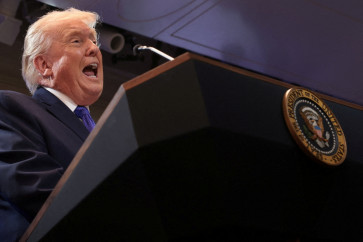Popular Reads
Top Results
Can't find what you're looking for?
View all search resultsPopular Reads
Top Results
Can't find what you're looking for?
View all search resultsLatte factor and other small expenses that could lead your finances astray
Have you ever experienced the puzzlement of why your funds disappear without you noticing?
Change text size
Gift Premium Articles
to Anyone
I
believe, with good financial management, no matter how much we earn, we can strive to achieve financial independence while still enjoying the lifestyle we want free of debt.
However, like any great vision, practicing financial management is easier said than done. Especially, since many of us have difficulty tracking down our own daily expenses, and knowing our expenses is the first step to managing our finances for the better.
Everyday expenses can be divided into two categories; big and small. Big or major expenses are quite easy to identify because they are obvious, and these expenses are usually what first come to mind when discussing budgeting, and tangible measures can be taken immediately because we know the sources. Examples for this type of expenses are housing installments and our children’s school fees among many others.
On the other hand, the latter category, the small or minor expenses are harder to notice because they are, well, small, unnoticeable. We know they are an expense, but people often underestimate them and go along with them. Have you ever experienced the puzzlement of why your funds disappear without you noticing? That is their doing, silently depleting our monthly budget leaving many of us unable to put aside money for savings or investment.
In this article, I point out some small expenses that you may need to reassess.
Membership fees
This can be anything, honestly. In my case, it was a gym membership fee. I used to go to the gym diligently, and the fees were worthwhile. Unfortunately, due to one or two circumstances, I stopped going to the gym. At first, it was a month, and then three months, and finally, a year. But, I did not put a stop to the membership because I thought that one day I could go work out in the gym again, or, maybe, I was just too lazy to take care of the administration to end it.
It was Rp 550,000 (US$ 38.49) a month, comparing it to my monthly income back then, it was not much at all. Annually, it would be Rp 6.6 million. Okay, I take back what I said, it was a lot after thinking it through. Looking in hindsight, if I were to put that money in time deposit I could earn, maybe, 5 percent a year. Not interested? Investing it in shares might earn us a return of 20 percent a year. What, now you are interested? Then, analyze what memberships you have and determine whether they are still beneficial or not. If not, cut ties immediately and start putting your money to work.
That morning coffee
There's a reason why the latte factor has become one of the trending buzzwords in personal finance.
When I ask friends why they drink coffee every day in the morning they answer, “It energizes me”, or “It wakes me up”, or something similar. I have to say, sorry, I do not understand why you need coffee to keep you fresh in the morning, as fortunately, I have my own way to handle drowsiness. But, I do understand how delicious coffee can be.
Anyway, there are people who need coffee every day, that is a fact. For those influenced by foreign brands, then a cup of coffee might cost up to Rp 50,000. That is not much, isn’t it? Looking closely, in a month you will need Rp 1.5 million, assuming you only need one cup per day. Is that still not much?
In my opinion, there are alternatives. By switching to local brands the price is just around Rp 20,000 a cup, and in a month Rp 600,000. With this, you cut Rp 900,000, which is more than 50 percent, on your coffee expenses. Or, if you want a more affordable way, buy a sachet of coffee in a minimarket that is more or less Rp 7,000, and use the glass and hot water from your workplace to make it. Now, how much do you save? Calculate it yourself.
Credit card interest and annual fees
Nope, I am not telling you to stop using credit cards. Personally, I still use them myself, even though after a transaction I usually pay it off fully in a couple of days. So, why do I use a credit card? For the points or rewards, or to adjust my cash flow.
There was a story from a long time ago of someone -me- who used a credit card to purchase something with a price tag of Rp 1 million. That someone only paid the minimum 10 percent payment and incurred interest of Rp 30,000, or around 3 percent a month on the amount before the minimum payment. The second month, after again paying the minimum amount the interest was Rp 27,000. Fast-forward a year later, although the principal had been reduced, that transaction had not been settled, and that someone continued to pay the interest on what he owed.
I learned my lesson. Since that time, after every transaction, it is always full-payment, or just plain cash. In addition, credit cards have an annual fee approximately Rp 300,000 to Rp 500,000 a year for a single card. So, how many cards do you have?
Read also: Seven situations in which you should not use your credit card
Food
Well, food is both a necessity and a luxury. Often, it is hard to determine into which category it falls when one is purchasing a meal. Nevertheless, food is consistently one of our major expenses.
Working people usually buy their meals. These can range from an affordable Rp 20,000, a standard Rp 50,000 with a drink, or a luxury Rp 100,000 and above. Not to mention all the snacks and food promos you may buy on an impulse from your phone that come along with delivery expenses. In a month, food-related expenses can be staggering if you do not control them. Eating a luxury meal is not something to be prohibited, because it can serve as motivation, but it needs to be timed well. Maybe, you can plan it for four times a month, or even twice. Ideally, make and bring your own meals. It is healthier because you know how they are prepared and cooked. More importantly, it is budget-friendly.
Smartphone usage
In these days, many people use smartphones as if it is the most normal thing to do and this is understandable because they allow people to perform many tasks at the same time with a push of a button. It is indeed a powerful device.
At the same time, it powerfully influences our monthly budget. Unless you have an all-inclusive data package, charges apply to every minute of call and data usage. In addition, there are charges that we might not be aware of until they appear on our monthly bill. Surprise! Thus, take a moment to look back at your data needs and browse all available packages, apply the appropriate one that will prevent you from over-usage.
Are there any more small expenses? I am sure there are a lot out there.
You are not alone in this, even the most financially savvy people are faced with these unexpected expenses. There are apps that can help you track your expenses, or you can ask people that you trust. Begin from there, and start weaving your financial safety net to help you achieve your financial goal. (dev/mut)
***
Pandu W Soeprapto is a graduate of Institut Teknologi Bandung and earned a master’s degree from Monash University. He currently works as an assistant vice president in corporate banking and has handled many financing projects in various sectors. He has a passion for teaching and loves to write about people and finance in bukanpohonuang.wordpress.com, and short story in Instagram @100wordtales.











